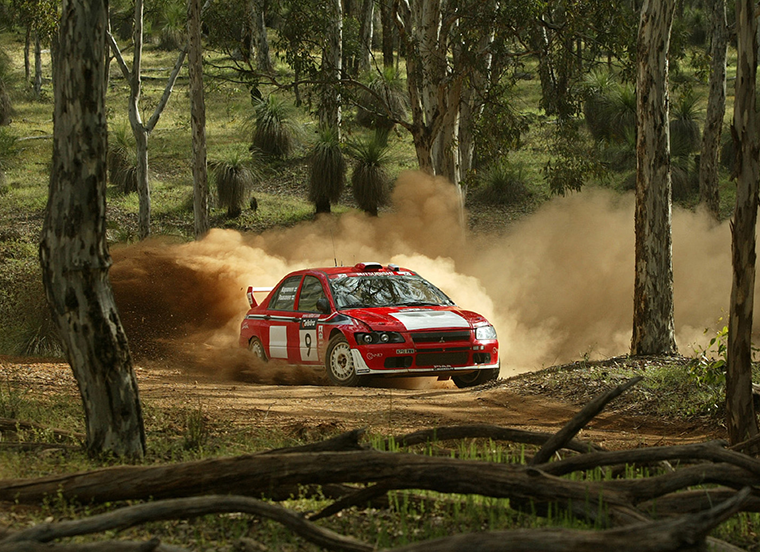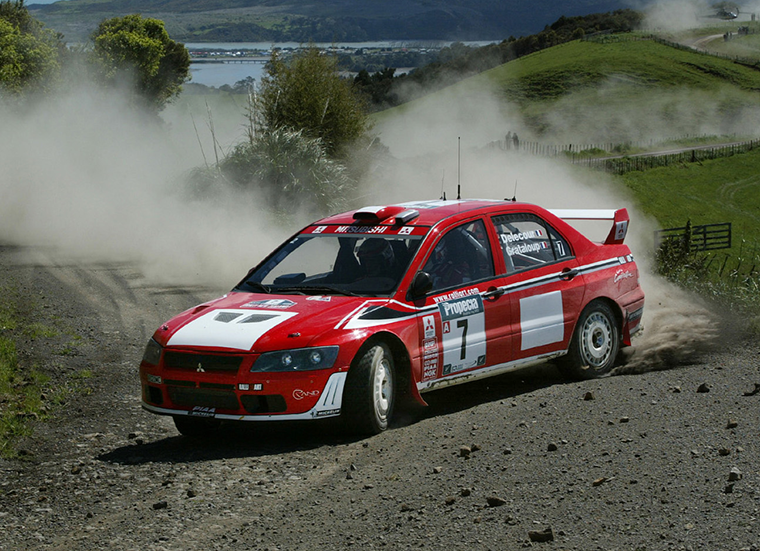WRC 2002
2002 World Rally Championship
When entering the 2002 season, MITSUBISHI MOTORS team decided to renew its driver lineup for the World Rally Championship (WRC). In place of Tommi Mäkinen and Freddy Loix, François Delecour (France), the winner of four WRC rounds, and Alistair McRae (UK) became regulars. In addition, a new scheme was established in order to enter young Jani Paasonen (Finland) in six gravel rallies within a works team structure. In the opening Monte Carlo Rally, Delecour managed to finish ninth even though he struggled with trying to grasp the distinctive characteristics of the LANCER WRC throughout the event. In the second round, Rally Sweden, Paasonen was in fourth position until he suffered a wheel breakage, and McRae eventually finished fifth. In the third round, Tour de Corse, Delecour raced tenaciously to finish seventh, just outside the points scoring positions.
| Rd. | name | Country |
|---|---|---|
| 1 | Rallye Monte Carlo | Europe, France, Africa and Monaco |
| 2 | Swedish Rally | Sweden |
| 3 | Tour de Corse | France |
| 4 | Rally Catalunya | Spain |
| 5 | Cyprus Rally | Cyprus |
| 6 | Rally Argentina | Argentina |
| 7 | Acropolis Rally | Greece |
| 8 | Safari Rally | Kenya |
| 9 | Rally Finland | Finland |
| 10 | Rallye Deutschland | Germany |
| 11 | Rallye Sanremo | Italy |
| 12 | Rally New Zealand | New Zealand |
| 13 | Rally Australia | Australia |
| 14 | Rally of Great Britain | United Kingdom |
 In the meantime, the motorsports development team in Okazaki and RALLIART Europe in Great Britain were rapidly designing an improved LANCER EVOLUTION WRC2. Previously, all components were designed in Okazaki, but starting from this LANCER WRC, except for the engine and drive system, RALLIART Europe was in charge from the planning stage. This change was made in order to shorten the development period. This way, the MITSUBISHI MOTORS team introduced the completely overhauled LANCER EVOLUTION WRC2 starting with round nine, Rally Finland, in August, where Paasonen finished eighth. Delecour set a second fastest time in the 10th round, Rally Germany, while Paasonen achieved MITSUBISHI MOTORS' first fastest time in 15 months in the 12th round, Rally New Zealand. There was no doubt that the LANCER WRC's performance was steadily improving.
In the meantime, the motorsports development team in Okazaki and RALLIART Europe in Great Britain were rapidly designing an improved LANCER EVOLUTION WRC2. Previously, all components were designed in Okazaki, but starting from this LANCER WRC, except for the engine and drive system, RALLIART Europe was in charge from the planning stage. This change was made in order to shorten the development period. This way, the MITSUBISHI MOTORS team introduced the completely overhauled LANCER EVOLUTION WRC2 starting with round nine, Rally Finland, in August, where Paasonen finished eighth. Delecour set a second fastest time in the 10th round, Rally Germany, while Paasonen achieved MITSUBISHI MOTORS' first fastest time in 15 months in the 12th round, Rally New Zealand. There was no doubt that the LANCER WRC's performance was steadily improving.However, at the end of all 14 rallies, MITSUBISHI MOTORS team’s result was nothing but humiliating. In the Drivers' Championship, they only earned the two points scored by McRae in Sweden and only nine in the Manufacturers Championship. The sudden stall of this top team, which grabbed three wins the previous year, was frankly an indication of how rapidly the WRC's level of competition had continued to raise since the introduction of the WR car regulations.

Up to that point, MITSUBISHI MOTORS' strength was that it was developing rally cars at the Technical Center in Okazaki, where all MITSUBISHI MOTORS' passenger cars were also being developed. Through close cooperation between the passenger car development and the rally car development departments, production vehicles fully incorporating requirements for the rally car were being designed. And the Group A LANCER EVOLUTION based on those production vehicles achieved a lot of success during those times. That was why the number of people and budget required for work involving WRC were much smaller than those of their rivals, but they finally were not able to meet the speed demanded in the new era. Consequently, MITSUBISHI MOTORS was forced to make some kind of organizational changes.
Result
| Rd. | 1 | 2 | 3 | 4 | 5 | 6 | 7 | 8 | 9 | 10 | 11 | 12 | 13 | 14 |
|---|---|---|---|---|---|---|---|---|---|---|---|---|---|---|
| F. Delecour | 9th | 34th | 7th | 9th | 13th | R | 11th | R | R | 9th | 10th | 9th | R | R |
| D. Grataloup | ||||||||||||||
| A. McRae | 14th | 5th | 10th | 13th | R | 8th | R | 9th | R | R | R | R | R | |
| D. Senior | ||||||||||||||
| J. Paasonen | 14th | R | 8th | R | 9th | R | ||||||||
| A. Kapanen |
| Driver | Co-driver | R - Retired | D - Disqualified |
| Rd. | 1 | 2 | 3 | 4 |
|---|---|---|---|---|
| F. Delecour | 9th | 34th | 7th | 9th |
| D. Grataloup | ||||
| A. McRae | 14th | 5th | 10th | 13th |
| D. Senior | ||||
| J. Paasonen | 14th | |||
| A. McRae |
| 5 | 6 | 7 | 8 | 9 | 10 | 11 |
|---|---|---|---|---|---|---|
| 13th | R | 11th | R | R | 9th | 10th |
| R | 8th | R | 9th | R | R | R |
| R | 8th |
| 12 | 13 | 14 |
|---|---|---|
| 9th | R | R |
| R | R | |
| R | 9th | R |
Driver
Co-driver
R - Retired
D - Disqualified
Spec
LANCER Evolution WRC
| Overall length | 4,360 mm |
|---|---|
| Overall width | 1,770 mm |
| Engine model | 4G63 4-cylinder DOHC turbo |
| Displacement | 1,997 cc |
| Maximum output | 300 ps |
| Maximum torque | 55 kg-m |
